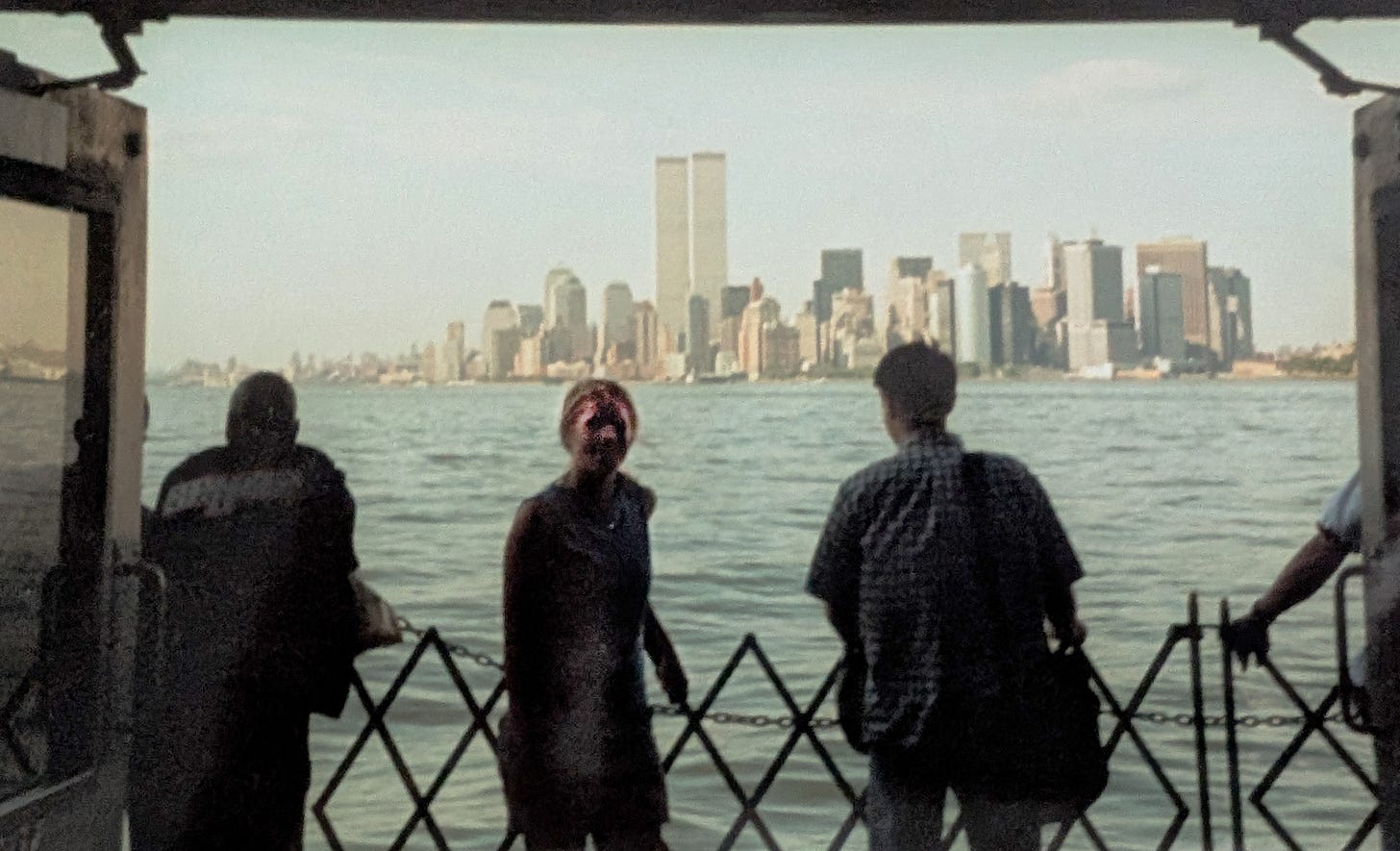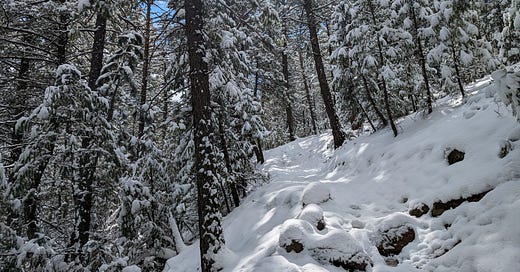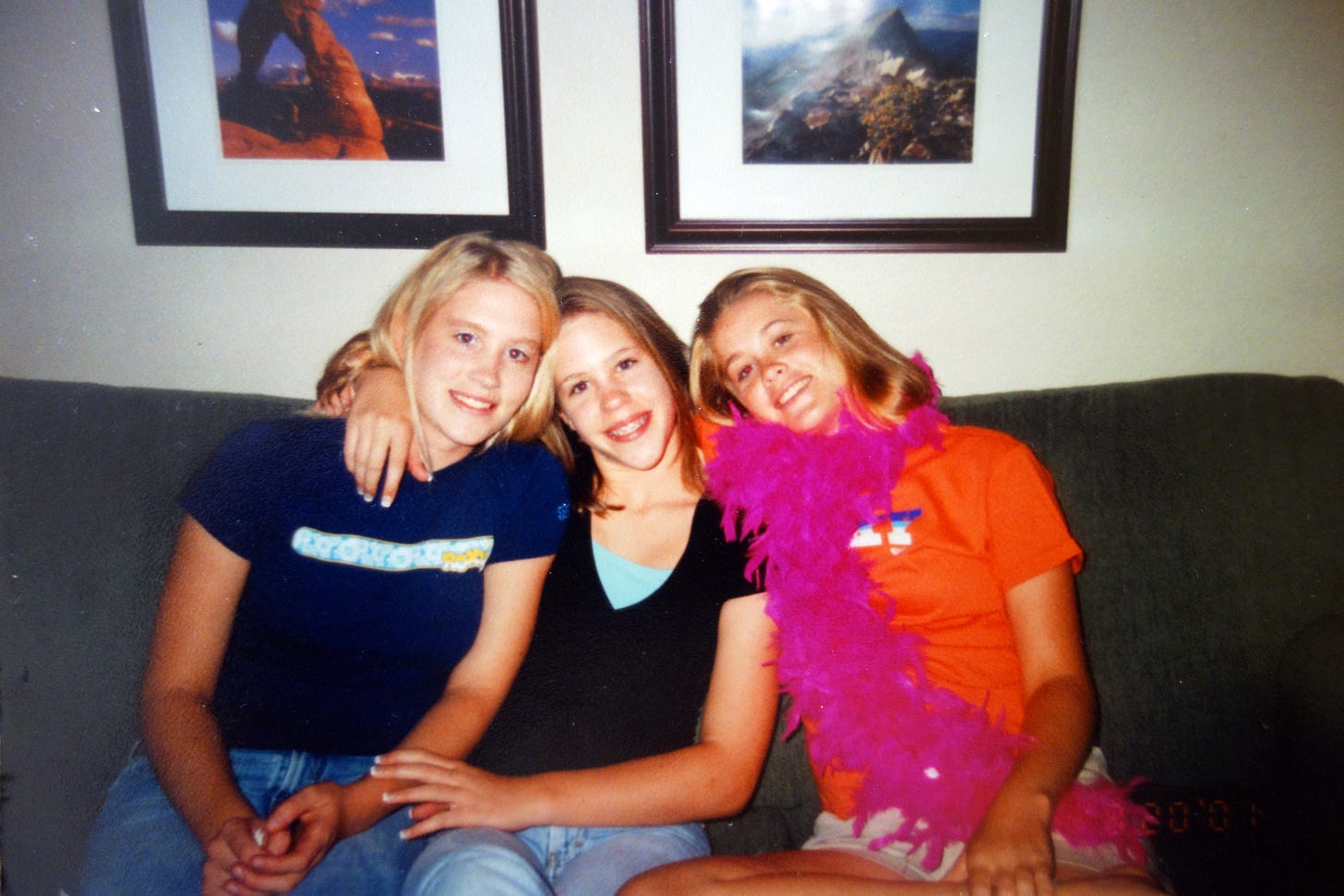I just finished “The Last American Road Trip” by Sarah Kendzior. I knew it was the kind of book written exactly for me, but I enjoyed it even more than I expected. It’s a beautiful travelogue of a troubled land — our home, everything we stand to lose, the places we’ve possibly already lost. In 2016, Sarah became convinced that the United States would be destroyed through a combination of authoritarianism and environmental devastation. So she vowed to take her children, then ages 5 and 9, to every historical site and national park she could. They hit the road whenever they had a chance, visiting 21 national parks and 38 states amid the economic volatility, natural disasters, climate change, political upheaval, and pandemic that defined the next eight years. As Sarah and her family drove over rutted pavement and beside sun-faded billboards along the nation’s most notorious highway, she observed: “Route 66 is America, and America is falling apart.”
Sarah is one of my favorite authors. She’s written extensively about the decay of middle America and the American middle class, the dynamics of American politics, the rise and fall of authoritarian regimes abroad, and more recently, the rise of an authoritarian regime at home. She’s eloquent and self-aware, cynical but not hopeless, alarmed but not afraid.
One of my favorite aspects of Sarah’s writing is that I feel like I am standing in the same place she stands, sharing her perspective. We grew up in the same America. We’re nearly the same age — we likely graduated from high school the same year — and she was a precocious young news junkie just like me. I feel a kinship with Sarah because we belong to a unique subgeneration, and many of us in this generation believe our timeline has had an outsized impact on who we are and what we’re becoming.
I realize that generational identity has become an annoying meme, and everyone believes they belong to an unprecedented time in history. But our micro-generation genuinely does seem equal parts united and untethered. We’re flailing through the void together.
We’re the babies of the late 70s, born at the tail-end of Gen X, a forgotten coda to a forgotten generation. Writers have called us “Xennials” or “The Oregon Trail Generation” (after the beloved computer game that defined our childhood). We grew up in an analog society and entered adolescence with the inception of the digital age. We identify with both the detached independence of Gen X and the righteous indignation of Millennials. We enjoyed youth in what the 1999 movie “The Matrix” likely correctly defined as the height of civilization — humanity’s peak technological and societal development — 1980 to 1999. But we’ve hardly had an easy go of it. We were born into the Energy Crisis Recession, came of age during the Dot-Com Bubble Recession, crossed into what should have been the height of our careers during the Great Recession, and entered middle age with the COVID-19 Recession. Sarah has never enjoyed a modicum of career stability because she took the career path of scholar and journalist just as both fields began their long slide toward oblivion. Which, girl, me too. I wish I’d written some best-selling books. But even best-sellers can’t provide stability in our increasingly illiterate culture and ever-volatile economic climate.
Were things ever good? Like most humans, I remember my youth through rose-colored lenses. The 90s were the sweet spot. The Soviet Union collapsed, the Cold War was over, and the Western world was at peace. We had fantastic pop culture and economic prosperity. We hung out with our friends and went to parties. We had no smartphones and no social media to drag us into teenage hell, but we did have AOL chatrooms where random commenters told us our angsty teenage poetry was amazing. And we weren’t scared of stalkers or cancellation because we were never going to be anything but anonymous on the Internet (if only we had stayed that way).
But then Sarah reminds me of the violent crises that turned me into a teenage insomniac: The Gulf War, the L.A. riots, the Waco massacre, the Rwandan genocide, the Oklahoma City bombing. Then there were the natural, cultural, and political disasters — Hurricane Andrew, O.J., the Bill Clinton sex scandal, the paparazzi-induced death of Princess Diana. Admittedly, most of these seem quaint next to the barrage of crises throughout the 2020s. Still, we were never not scared. We spent grade school hiding under our desks during nuclear bomb drills and left high school amid the Columbine massacre and the rise of school shootings.
I remember the way these events affected me. I can still tell you where I was when I learned that George H.W. Bush had initiated Operation Desert Storm, the first significant U.S. war of my lifetime — I was in church — and where I was when Diana died — Labor Day weekend 1997, just before I started my first college classes, partying with my friends in a beach house on Bear Lake. And sure, I’m old now and remember far less about day-to-day disasters. Still, it’s strange to remember how any of these events could have felt so significant.
“Sometime in the twenty-first century, a day with a fascist rally or a mass murder became just a day,” Sarah wrote. “I do not know the exact tipping point, only that I cannot stop searching for it, like if I knew where it started, I could undo it. I want to unwind our century and cut the cord, let that alternative America spin off into the darkness and live instead in the future that never arrived.”

For my generation, it’s natural to say that everything changed on September 11, 2001. I had recently turned 22 and had just started working in the first major role of my journalism career as the community news editor at the Tooele Transcript-Bulletin. I had only been on the job for two weeks when I walked into the office at 7 a.m. sharp for my Tuesday morning shift and watched in real time on television as an airplane hit the south tower of the World Trade Center. In the background, the north tower was already enveloped in flames. My co-workers and I stood in stunned silence as the television emitted only the sounds of screams and cries for several eternal seconds.
“These weren’t accidents,” the sports editor eventually mumbled. The television reporter still said nothing about what was happening, only murmuring “oh no” at intervals.
My news editor turned to me, his young new employee, and said with a grim face and tonal stoicism, “You just saw the world change.”
I can still disappear into the emotions of those early hours, the disbelief and terror, all of those people dead, all of those people. Then came the Pentagon, the firefighters, the towers collapsing, and United Flight 93. But before I was able to witness any of that, the news day had to go on.
My assignment for the day was covering a mock terrorist attack on the Deseret Chemical Depot. This is a true story. A drill was scheduled for September 11, 2001, to help first responders practice for the medical emergencies likely to happen if terrorists attacked the U.S. Army chemical weapons incinerator that was located in the Utah desert just a few miles south of Tooele. Such an attack would send dangerous chemicals into the community. I, a bright-eyed young reporter, excitedly volunteered to participate in the drill and write about the experience. Volunteers were going to slather me with make-up to depict chemical burns, and then other volunteers were going to hose me down and apply pretend medical treatments. My editor didn’t know whether the drill would still happen after what we’d witnessed that morning, but he thought it seemed plausible. This is the Army, after all. They keep a tight schedule.
A photographer and I drove out together and entered the compound just as the Deseret Chemical Depot went into lockdown. For more than eight hours, we were not allowed to leave. The photographer decided to head outside and take photos of the cement barricades being placed across the entrance, our only escape route in this well-barricaded U.S. Army site. Everyone was trapped. No one had anything to do, so the facility’s commander pulled me into his office to give an exclusive interview. He was a strongly opinionated man who believed the United States had been soft on terror for far too long. He knew the hijackings were the work of Osama bin Laden and his “cronies.” I distinctly remember him blaming bin Laden. It was the first time I’d heard that name. The commander ranted for hours, and I took extensive handwritten notes. My fingers cramped as I tried to take in everything from a long diatribe about how the U.S. must declare war on Iraq, Iran, Afghanistan, and all of those countries that harbored terrorists. I nodded in agreement at everything he said. He was so powerful. So wise. What a big break for my journalism career!
That afternoon, exhausted and strung out, I returned to the newsroom. Despite my horror and fatigue, I was filled with determination. I, a 22-year-old small-town reporter, was going to bring meaning to this madness. I excitedly told the editor about the interview, pointed out the significance of this local tie-in to the news story of the decade, and showed him my notes.
“We can’t use any of that,” my editor said, shrugging apologetically. Instead, I stayed at work until 10 p.m. that night to finish writing and laying out my community news spread about a resident who built elaborate cement flower pots in his backyard. My efforts would go on to win the 2001 “Best Feature Page” award from the Utah Press Association.
And this … this is what has defined my adult life. Unprecedented events are forever happening. The world is forever changing. Capitalism must go on.
In 1993, my generation’s prophet, Kurt Cobain, opened the Nirvana album “In Utero” with this lyric:
Teenage angst has paid off well
Now I’m bored and old
Self-appointed judges judge
More than they have sold
When we sang “Serve the Servants” at the top of our lungs in 1993, we thought we were rebelling against our staid suburban lives and boring parents. Now we are old and we’d give anything to be bored. Our teenage angst gave us nothing but nostalgia for stable times that were never actually stable.
So I was delighted when Sarah quoted this lyric last summer while eulogizing other early-90s cultural icons who were near and dear to my heart: Shannen Doherty and Luke Perry of Beverly Hills, 90210 fame. Luke died of a stroke at 52 in 2019, and Shannen died of cancer last year on the same day Donald Trump was targeted in an assassination attempt during a campaign rally. “Brenda and Dylan Are Dead” is possibly my favorite essay of Sarah’s, because of the unique pop culture references and because she frames the significance of our 90210 nostalgia with a death-defying drive along Colorado’s Highway 550.
She wrote that Doherty’s death hit her hard. Me too! Shannen Doherty was too young and too much a part of our fading youth to just fade away. Sarah notes her mourning for Shannen Doherty was likely a projection from the bigger picture, events we don’t yet have the words to describe.
“Beverly Hills, 90210 aired between the end of the Cold War and 9/11: a period so calm it feels in retrospect like a contemptuous ruse, a mocking preparation for a peaceful future no powerbroker intended to give,” she wrote. “Now politics is our soap opera, and they will not cancel the show, no matter how much we hate it, no matter how many audience members they lose. Every day is sweeps for a country turning to ashes.”
This essay is also where I learned that Sarah and I were the same person in seventh grade. I wanted to reach out and hug her:
“By 1991, I expected little good to come from American politicians — I ruined a third-grade sleepover party by ranting about Iran-Contra — but even I would have expected more than feeble, repetitive surrender. A uniformly weak reaction to a recurring national security threat implies bipartisan betrayal and a foregone conclusion. Not an election, but a reinstallation. It would be exciting to be proven wrong.” (Note: Sarah wrote this on July 17, 2024, days before Kamala Harris became the Democratic nominee and months before Trump won the election.)
I try to remember all the terrible things that happened to America over the last thirty days, but I can’t. It’s impossible to keep them straight: the losses and lies and capitulation and complicity and rulings and retribution against ordinary Americans just trying to survive. But I know that July 13 will always be the day Shannen Doherty died.”
Today, Shannen has been gone for 281 days. The unprecedented events that have happened since then are so numerous that I can no longer fathom them. Everything is changing so fast. It’s so strange to be 45 years old and have no sense of the future. The future could be anything, absolutely anything. It could be a staid retirement in France with bicycle touring and wine tasting, or it could be living in a cave. At least in both scenarios, we’d still be alive. Even that seems … optimistic.
But also, on some level, it seems like we’ve always known that we’d never know the future. And weirdly, it feels like we’re ready … come what may.
“1991 crashes into 2024, like my photo of the Colorado mountains,” Sarah wrote. “It was always one story, one ever-twisting tale. One long road at the edge of a cliff without guardrails, driven by people who love the scenery despite the risks.”






Thank you for this terrific column! I really appreciate it and I'm so glad you got so much out of my work. I don't know if you read HIDING IN PLAIN SIGHT, but I discuss working, at age 22, at a newspaper (The NY Daily News) during the 9/11 attacks -- so your story rang painfully true for me as well. Anyway, thank you, fellow Oregon Trail wagon mate!
"Route 66 is America, and America is falling apart.” Route 66 was a road where the restaurants and hotels would not serve people of color. In essence, yes that is a reflection of America.